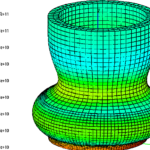Today Asetek announced a new order from one of its existing OEM partners for its RackCDU D2C (Direct-to-Chip) liquid cooling solution. The order is part of a new installation for an undisclosed HPC customer. “I am very pleased with the progress we are making in our emerging data center business segment,” said André Sloth Eriksen, CEO and founder of Asetek. “This repeat order, from one of our OEM partners, to a new end customer confirms the trust in our unique liquid cooling solutions and that adoption is growing.”
Archives for March 2017
Video: Why Supercomputing is Important for Science
In this video, Ruben Cruz Garcia from the Earth Sciences department at BSC, describes how supercomputing is key to his research. He also explains what he would do if he had unlimited access to a fully operational exascale computer.
Video: Computational Fluid Dynamics for Surgical Planning
“The current versions of the codes use MPI and depend on finer and finer meshes for higher accuracy which are computationally demanding. To overcome the demands, the team has gained access to their state-of-the-art cluster equipped with POWER CPUs and Tesla P100 GPUs — and turning to OpenACC and machine learning to accelerate their science. This has allowed them to spend the least resources on programming, and effectively utilize available compute resources.”
Berkeley Lab Tunes NWChem for Intel Xeon Phi Processor
A team of researchers at Berkeley Lab, PNNL, and Intel are working hard to make sure that computational chemists are prepared to compute efficiently on next-generation exascale machines. Recently, they achieved a milestone, successfully adding thread-level parallelism on top of MPI-level parallelism in the planewave density functional theory method within the popular software suite NWChem. “Planewave codes are useful for solution chemistry and materials science; they allow us to look at the structure, coordination, reactions and thermodynamics of complex dynamical chemical processes in solutions and on surfaces.”
Radio Free HPC Looks at Europe’s Push for Leadership in Global HPC
In this podcast, the Radio Free HPC team looks at some the top High Performance Computing stories from this week. First up, we look at Europe’s effort to lead HPC in the next decade. After that, we look at why small companies like Scalable Informatics have such a hard time surviving in the HPC marketplace.
Register now for the International Conference on Massive Storage Systems and Technology (MSST 2017)
Registration is open for the 33rd International Conference on Massive Storage Systems and Technology (MSST 2017.) The event takes place May 15-19 in Santa Clara, California. “Since the conference was founded by the leading national laboratories, MSST has been a venue for massive-scale storage system designers and implementers, storage architects, researchers, and vendors to share best practices and discuss building and securing the world’s largest storage systems for high-performance computing, web-scale systems, and enterprises.”
RCE Podcast Looks at Deal.II Finite Element Library
“deal.II — a name that originally meant to indicate that it is the successor to the Differential Equations Analysis Library — is a C++ program library targeted at the computational solution of partial differential equations using adaptive finite elements. It uses state-of-the-art programming techniques to offer you a modern interface to the complex data structures and algorithms required.”
New ARM Architecture Targets AI
ARM has taken a step into the artificial intelligence market with the announcement of a new micro-architecture – DynamIQ – specifically designed for artificial intelligence (AI). “DynamIQ technology is a monumental shift in multi-core microarchitecture for the industry and the foundation for future ARM Cortex-A processors. The flexibility and versatility of DynamIQ will redefine the multi-core experience across a greater range of devices from edge to cloud across a secure, common platform.”
Huawei to Provide HPC Services to Tenerife in Canary Islands
Today Huawei an agreement with the Institute of Technology and Renewable Energy (ITER) to provide HPC services on Tenerife, one of the Spanish-controlled Canary Islands off the west coast of Africa. “The agreement established the collaboration between ITER and Huawei to jointly develop the capacity in super-computation, smart technology, big data applications and analysis applications, in which we have made important progress,” said Carlos Antonio Rodriguez, president of the local Administrative Council that runs ITER.













